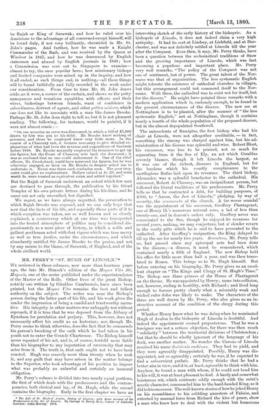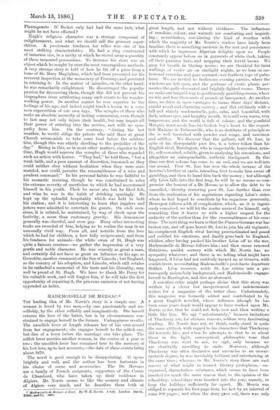MR. PERRY'S "ST. HUGH OF LINCOLN."* WE reviewed in these
columns, now more than fourteen years ago, the late Mr. Dimock's edition of the Magna Vita Sti. Ilagonis, one of the series published under the superintendence of the Master of the Rolls. Other lives of the great Bishop. notably one written by Giraldus Cambrensis, have since been printed, but the Magna Vita remains the best and fullest authority on the subject. The writer was near the Bishop's person during the latter part of his life, and his work gives the reader the impression of being a candid and trustworthy narra- tive. His integrity in other matters was unhappily not without reproach, if it is true that he was deposed from the Abbacy of Eynsham for peculation and perjury. This, however, does not necessarily affect his credit as an historian ; nor, though Mr. Perry seems to think otherwise, does the fact that he commends his patron's breaking of the oath which he had taken in his youth not to enter the Grande Chartreuse. The Bishop himself never repented of his act, and is, of course, tenfold more liable than his biographer to any imputation of unveracity that may arise from it. The truth is, that oath ought not to have been exacted. Hugh was scarcely more than twenty when he took it, and any guilt that may have arisen in the matter belongs to the Superior, who took advantage of his position to impose what was probably an unlawful and certainly an immoral obligation.
Mr. Perry's volume is divided into two nearly equal portions, the first of which deals with the predecessors and the contem- poraries, both clerical and lay, of St. Hugh, while the second contains the biography. Early in the first chapter we have an
• The Life of St. Hugh of Avalon. Bishop of Lincoln ; with Some Account of his Predecessors in the See of Lincoln. By George G. Perry, M.A., Canon of Lincoln. London: John Murray. 1879. interesting sketch of the early history of the bishopric. As a bishopric of Lincoln., it does not indeed claim a very high antiquity. It had its seat at Lindsey, at Lichfield, and at Dor- chester, and was not definitely settled at Lincoln till the year after the Conquest. Even then, it may, Mr. Perry thinks, have been a question between the ecclesiastical traditions of Stow and the growing importance of Lincoln, which was fast becoming a populous and important place. Mr. Perry very well remarks, "The policy of the Conquest was not one of sentiment, but of power. The great talent of the Nor- mans was that of organisation. The less systematic English might tolerate the existence of cathedral churches in villages, but this arrangement could not commend itself to the Nor- mans. With them, the cathedral was to exist not for itself, but for the diocese." He might have pointed these remarks with a modern application which is, curiously enough, to be found in the present circumstances of the diocese. The new see at Nottingham is to be planted, after the manner of " the less systematic English," not at Nottingham, though it contains nearly a fourth of the whole population of the proposed diocese, but in the almost depopulated Southwell.
The antecedents of Remigius, the first bishop who had his chair at Lincoln, were not altogether creditable, — in fact, something like simony was charged against him, but his ad- ministration of his diocese was splendid and wise. Robert Bloet, his successor, was less to be praised, not so much for separating from it the See of Ely, an act which Giraldus severely blames, though it left Lincoln the largest, as it was one of the richest, dioceses in England, but for the burdens which his courtly complaisance to the sacrilegious Rufus laid upon its revenues. The third bishop, Alexander, was a splendid benefactor to the cathedral. His successor, Robert de Chesney, was an insignificant person, but followed the liberal traditions of his predecessors. Mr. Perry tells us that he contracted a debt, for building purposes, of £300, to "Aaron, the Jew of Lincoln," pledging, by way of security, the °momenta of the church. A far worse scandal' was the appointment of his successor, Geoffrey Plantagenet, one of Henry II.'s numerous natural sons, a lad of less than twenty-one, and in deacon's orders only. Geoffrey never was consecrated to the See, though he enjoyed its revenues for several years, making, we may conjecture, but a slender return in the costly gifts which he is said to have presented to the cathedral. After Geoffrey's resignation, the King delayed to fill up the see for nearly two years. Seventeen, Mr. Perry tells us, had passed since any episcopal acts had been done in the diocese,—a diocese, it must be remembered, which contained nearly a fifth of England. The new Bishop held his office for little more than half a year, and was then trans- lated to Rouen. This brings us to St. Hugh himself. But before entering on his biography, Mr. Perry gives us an excel- lent chapter on " The Kings and Clergy of St. Hugh's Time." The Bishop saw three princes of the House of Plantagenet on the throne. He was appointed by Henry; came into collision, not, however, ending in hostility, with Richard ; and lived long enough to foresee pretty clearly what a miserably weak and wicked ruler John was likely to make. The characters of the three are well drawn by Mr. Perry, who also gives us an in- structive account of the condition of the clergy during this period.
Whether.Henry knew what lie was doing when he nominated Hugh of Avalon to the bishopric of Lincoln is doubtful. And indeed the appointment seemed preposterous. That he was a foreigner was not a serious objection, for there was then much " solidarity " between the territorial divisions of Christendom ; but that he should be wholly ignorant of the language of his flock, was another matter. No wonder the Canons of Lincoln received his name derisionis eachinno. They had to yield, and they were agreeably disappointed. Possibly, Henry was dis- appointed, not so agreeably ; certainly he was, if he expected to find a subservient prelate. Mr. Perry thinks that he had a better aim in view, and it is, at least, agreeable to think with him. Anyhow, he found a man with whom, if he could not bend him to his will, it was at least pleasant to deal. A hardy and somewhat boisterous wit, which contrasts oddly enough with the saint's ascetic character, commended him to the hard-headed King, as it did to his successor. The well-known stories of how he joked Henry on his resemblance to his cobbling ancestors of Falaise, and extorted by manual force from Richard the kiss of peace, show a man who knew how to deal with the violent but humorous Plantagenets. If Becket only had had the same tact, what might he not have effected?
Hugh's religious character was a strange compound of enlightenment, and what we should call the grossest super- stition. A passionate fondness for relics was one of his most striking characteristics. He had a ring constructed of immense size, in a cavity of which he stored away a quantity of these treasured possessions. To increase his store was an object which he sought by even the most unscrupulous methods. A very strange story is told of how he bit off a piece from a bone of St. Mary Magdalene, which had been presented for his reverent inspection at the monastery of Fescamp, and persisted in retaining it. In the matter of miracles, on the other hand, he was remarkably enlightened. He discouraged the popular passion for discovering them, though this did not prevent his biographers from attributing many such events to his wonder- working power. In another matter he rose superior to the feelings of his age, and indeed might teach a lesson to a com- mon superstition of our own days. The scruples of those who make an absolute necessity of fasting communion, even though to fast may not only injure their health, but may impair all their power of entering into the service, met with no sym- pathy from him. On the contrary, "during the hot weather, he would oblige the priests who said Mass at great Church ceremonials to take some food before the celebra- tion, though this was utterly shocking to the prejudice of the day." Rising in this, as in most other matters, superior to his time, Hugh would reprove the scruples of those who regarded such an action with horror. " They had," he told them, " but a weak faith, and a poor amount of discretion, inasmuch as they could neither obey without hesitation when they were com- manded, nor could perceive the reasonableness of a wise and prudent command." In his personal habits he was faithful to his monastic training, though he was constrained to relax the extreme severity of asceticism to which he had accustomed himself in his youth. Flesh he never ate, but he liked fish, and wine he was in the habit of drinking sparingly. He kept up the splendid hospitality which was held to befit his station ; and it is interesting to learn that jugglers and jesters were admitted to entertain his guests. On such occa- sions, it is related, he maintained, by way of check upon the festivity, a more than customary gravity. His demeanour generally was cheerful, and even gay. Many other interesting traits are recorded of him, helping us to realise the man in an unusually vivid way. From all, and notably from the love which he had for children, a love fully reciprocated, and from his fondness for animals—the white swan of St. Hugh was quite a famous creature—we gather the impression of a very gentle and noble character. He was scarcely as great a man, and certainly did not have as great an influence on his age, as Grosstete, another ornament of the See of Lincoln ; but England, as the country of his adoption, and Lincoln, which still retains in its cathedral a memorial of his taste and his liberality, may well be proud of St. Hugh. We have to thank Mr. Perry for his valuable work, and will forgive him, if he will take the first opportunity of repairing it, the grievous omission of not having appended an index.



































 Previous page
Previous page